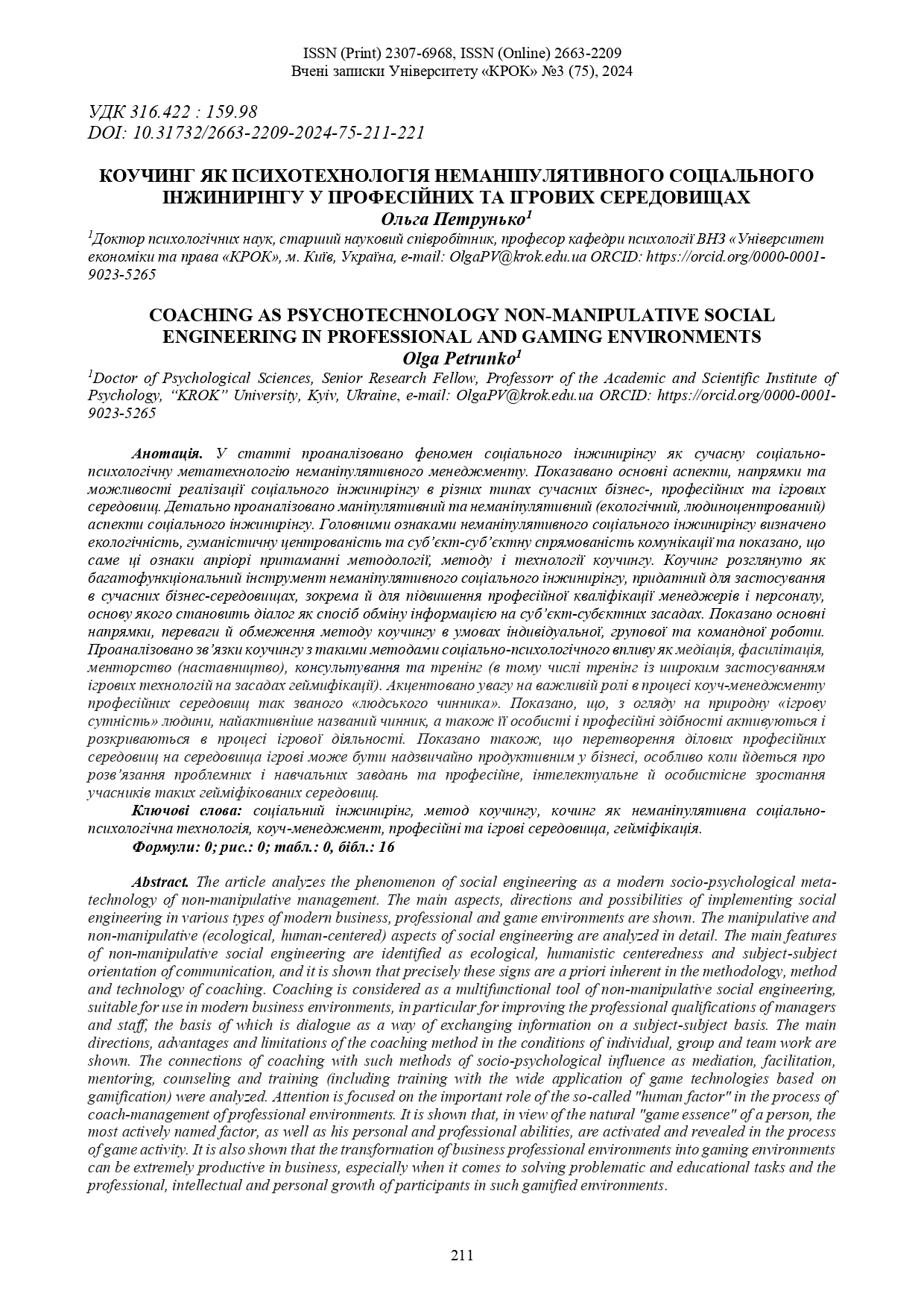COACHING AS PSYCHOTECHNOLOGY NON-MANIPULATIVE SOCIAL ENGINEERING IN PROFESSIONAL AND GAMING ENVIRONMENTS
DOI:
https://doi.org/10.31732/2663-2209-2024-75-211-221Keywords:
social engineering, coaching method, coaching as a non-manipulative socio-psychological technology, coach management, professional and game environments, gamificationAbstract
The article analyzes the phenomenon of social engineering as a modern socio-psychological meta-technology of non-manipulative management. The main aspects, directions and possibilities of implementing social engineering in various types of modern business, professional and game environments are shown. The manipulative and non-manipulative (ecological, human-centered) aspects of social engineering are analyzed in detail. The main features of non-manipulative social engineering are identified as ecological, humanistic centeredness and subject-subject orientation of communication, and it is shown that precisely these signs are a priori inherent in the methodology, method and technology of coaching. Coaching is considered as a multifunctional tool of non-manipulative social engineering, suitable for use in modern business environments, in particular for improving the professional qualifications of managers and staff, the basis of which is dialogue as a way of exchanging information on a subject-subject basis. The main directions, advantages and limitations of the coaching method in the conditions of individual, group and team work are shown. The connections of coaching with such methods of socio-psychological influence as mediation, facilitation, mentoring, counseling and training (including training with the wide application of game technologies based on gamification) were analyzed. Attention is focused on the important role of the so-called "human factor" in the process of coach-management of professional environments. It is shown that, in view of the natural "game essence" of a person, the most actively named factor, as well as his personal and professional abilities, are activated and revealed in the process of game activity. It is also shown that the transformation of business professional environments into gaming environments can be extremely productive in business, especially when it comes to solving problematic and educational tasks and the professional, intellectual and personal growth of participants in such gamified environments.
Downloads
References
Антонов, Т. А. (2024). Вплив повномасштабного вторгнення на відеоігрову активність в Україні: психологічний копінг у часи кризи. Вчені записки Університету «КРОК». 1(73). 295–302.
Берн, Е. (2016). Ігри, у які грають люди. Харків : Клуб Сімейного Дозвілля. 256 с. ІSBN 978-617-12-0454-6
Бліхар, М. Медіація як спосіб вирішення адміністративних спорів. Підприємництво, господарство і право. Адміністративне право і процес. 2020. 10. 78–82.
Бондаренко, С.М. (2016). Ділова досконалість підприємств як фактор конкурентоспроможності національної економіки України. Економічний простір. 116. 200–208.
Бутко, М. П., Дітковська, М. Ю., Задорожна, С. М., Іванова, Н. В., Олійченко, І. М., Оліфіренко, Л. Д., Пепа, Т. В., Повна, С. В., Шабардіна, Ю. В., Шевченко, О. М. (2019). Стратегічний менеджмент : навч. посіб. / за ред. М. П. Бутка. Київ : Вид-во Центр учбової літератури. 375 с.
Горбунова, В. В. (2014). Психологія командотворення: ціннісно-рольовий підхід до формування та розвитку команд : монографія. Житомир : Вид-во ЖДУ ім. І. Франка. 380 с.
Казміренко, В.П. (2021). Соціальна психологія організації: монографія. Вид. 2-ге, випр. і доп. К.: Видавничий дім «Гельветика». 482 с.
Карамушка, Л. М. (2024). До проблеми розробки технологій забезпечення психологічного здоров’я особистості в умовах війни. Організаційна психологія. економічна психологія. 32 (2). С. 41–58.
Ложкін, Г. В., Пов’якель, Н. І. (2007). Психологія конфлікту: теорія і сучасна практика : навч. посіб. Київ : Вид-во Професіонал. 410 с.
Морозов, В. В., Чередніченко, А. М., Шпильова, Т. І. (2009). Формування, управління та розвиток команди проекту : навч. посіб. / за ред. В. В. Морозова. Київ : Вид-во Таксон. 463 с.
Муха, Р. А. (2015). Команда, її сутність та особливості розвитку. Ефективна економіка. 8. http://www.economy.nayka.com.ua/?op=1&z=4253
Петрунько, О. В. & Плющ, О. М. (2021). Перспективи застосування екологічного підходу в сучасних психологічних дослідженнях. Вчені записки Університету «КРОК», 4 (64). С. 205–216.
Чалдіні, Р. (2022). Психологія впливу. Харків : Клуб Сімейного Дозвілля, 608 с. ISBN 978-617-12-9625-1
Belbin, R.M. (2010). Management Teams: Why They Succeed or Fail (3nd ed.). London : Routledge. 204 р. https://doi.org/10.4324/9780080963594
Bishop, James W.; Scott, Dow; Maynard-Patrick, Stephanie; and Wang, Rei (2014). Teams, Team Process, and Team Building. Clinical Laboratory Management of Business, 2nd Edition. Faculty Publications and Other Works, 373–391. http://dx.doi.org/10.1128/ 9781555817282.ch18
Tuckman, B.W. Developmental sequence in small groups. Psychological Bulletin. 1965. 63 (6). 384–399.

Downloads
Published
How to Cite
Issue
Section
License

This work is licensed under a Creative Commons Attribution-NonCommercial 4.0 International License.

